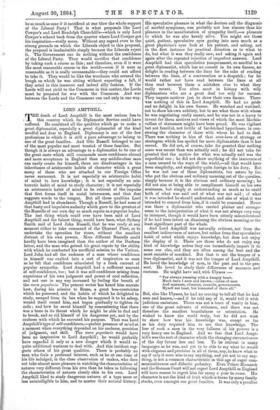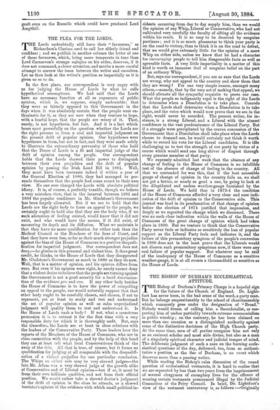LORD AMPTHILL.
THE death of Lord Ampthill is the most serious loss to
• 1 this country which its Diplomatic Service could have suffered. He combined all the qualities which go to make a great diplomatist, especially a great diplomatist of the kind needful and dear to England. Diplomacy is one of the few professions in which it is still a pure advantage to belong to one of the great families. And Odo Russell belonged to one of the most popular and most trusted of those families. But though it js always an advantage to a diplomatist to be one of the great caste which still commands more confidence abroad and more acceptance in England than any middle-class man can easily create for himself, there are disadvantages in the inheritance of aristocratic habits of character which a great many of those who are attached to our Foreign Office never surmount. It is not especially an aristocratic habit of mind to love knowledge • it is not especially an aris- tocratic habit of mind to study character; it is not especially an aristocratic habit of mind to be reticent of the impulse that first forms itself in social intercourse, and that first suggests words to the tongue. But all these qualities Lord Ampthill had in abundance. Though a Russell, he had none of that hasty and impulsive audacity which gave to the greatest of the Russells of our own day so much repute as a popular leader. The last thing which could ever have been said of Lord Ampthill and the falsest thing, would have been, what Sydney Smith said of Lord John Russell, that he was ready at any moment either to take command of the Channel Fleet, or to undertake the operation for stone, without the smallest distrust of his own powers. More different Russells could hardly have been imagined than the author of the Durham letter, and the man who gained his great repute by the ability with which he conducted his unofficial mission to the Vatican. Lord John had all the rashness of a man whose confidence in himself was exalted into a sort of inspiration so soon as he felt that confidence stimulated by a fresh current of popular sympathy. Lord Ampthill bad a sufficient amount of self-confidence, too ; but it was self-confidence arising from experience of his own judgment and power of cool reflection, and not one in any way increased by feeling the breath of the aura popularis. The present writer has heard him narrate how, during his mission to Rome, a great boa-constrictor which he possessed, and the habits of which he delighted to study, escaped from its box when he supposed it to be asleep, wound itself round him, and began gradually to tighten its coils ; and how he saved himself by remembering that there was a bone in its throat which he might be able to find and to break, and so rid himself of his dangerous pet, and by the coolness with which he executed his purpose. That was Lord Ampthill's type of self-confidence,—perfect presence of mind at a moment when everything depended on his coolness, precision of judgment, and skill. The aura popularis would have been no inspiration to Lord Ampthill ; he would probably have regarded it only as a new danger which it would re- quire additional wariness to deal with. And this incident sug- gests others of his great qualities. There is probably no man who feels a profound interest, such as he at one time of his life indulged, in the close observation of snakes, who does not take almost more pleasure in watching the characteristics of natures very different from his own than he takes in following the characteristics of natures closely akin to his own. Lord Ampthill liked to study dangerous natures of a type more or lees unintelligible to him, and to master their natural history. His speculative pleasure in what the doctors call the diagnosis of morbid symptoms, was probably not less sincere than his pleasure in the manifestation of sympathy itself,—a pleasure to which he was also keenly alive. You might see those quiet, patient, speculative eyes gazing into men much as a great physician's eyes look at his patient, and asking, not in the first instance for practical direction as to what to do, but what it was they really saw, and asking it again and again after the repeated rejection of imperfect answers. Lord Ampthill had that speculative temperament, so needful to a great diplomatist, which has no conceit in its own finesse, no delight in reading between the lines for the sake of reading between the lines, of a conversation or a despatch ; for he would rather not have read between the lines at all than read between them a mistaken clue to what they really meant. You often meet in history with wily diplomatists who are a great deal too wily for success. They impute motives just to show their own finesse. There was nothing of this in Lord Ampthill. He had no pride and no delight in his own finesse. He watched and watched, not to show his own subtlety, but to see what those with whom he was negotiating really meant, and he was not in a hurry to invent for them motives and views of which the most Machia- vellian of statesmen might have been proud. He was vigilant but not fanciful, not fertile of far-fetched hypotheses, in con- struing the character of those with whom he had to deal. There was nothing in him of that over-love of strategy or strategem which has spoiled far more diplomatists than it has served. He did not, of course, take for granted that nothing more was meant than was actually said ; he did not take for granted that the motive for what was actually said was the superficial one ; he did not show anything of the innocence of a man unused to the ways of the world,—all that would have been simplicity, and simplicity quite foreign to his duty. But he was not one of those diplomatists, too astute by far, who put the obvious and ordinary meaning out of the question, simply because it is the obvious and ordinary meaning ; he did not aim at being able to compliment himself on his own acuteness, but simply at understanding as much as he could both of what was said and of what was not said ; of what it was intended he should understand, and also of what it was intended to conceal from him, if it could be concealed. Never was there a diplomatist who carried plainer and stronger sense to the interpretation of what it was not always very easy to interpret, though it would have been utterly misunderstood if he had been intent on dismissing the obvious meaning as the least significant part of the whole.
And Lord Ampthill was naturally reticent, not from the smallest indirectness of nature, but rather from that speculative habit of mind which enjoys knowledge, but does not enjoy the display of it. There are those who do not enjoy any kind of knowledge unless they can immediately_ impart it to some one else, and they are often among the best and the most amiable of mankind. But that is not the temper of a true diplomatist, and it was not the temper of Lord Ampthill. He loved the knowledge of men, in the past and in the pre- sent. He loved to study their differences of manners and customs. He might have said, with Ulysses :—
"For always roaming with a hungry heart, Much have I seen and known,—cities of men And manners, climates, councils, governments, Myself not least, but honoured of them all."
But, also like Ulysses, he had no craving to tell all that he had seen and known,—and if he told any of it, would tell it with judicious omissions. There was not a trace of vanity in him, one of the great solvents of reticence, and there was not therefore the smallest boastfulness or ostentation. He wished to know the world truly, but he did not wish to show how true his knowledge was, except so far as his duty required him to use that knowledge. The loss of such a man in the very fullness of his powers is a very heavy one to England. And we fear that Lord Ampt- hill's was the sort of character which the changing circumstances
of the day favour less and less. To be reticent in many languages as he was, and yet to be able to say what he would with elegance and precision in all of them, nay, to know what to say if only it were wise to say anything, and yet not to say any- thing, is not a common characteristic in this age of eager com- municativeness and didactic pedantry. Even Prince Bismarck and the German Court will not regret Lord Ampthill as England will have reason to regret him for many a year to come. His character is not the kind of fruit which is borne by many family stocks, even amongst our great families. It was only a peculiar
graft even on the Russells which could have produced Lord Ampthill.



































 Previous page
Previous page